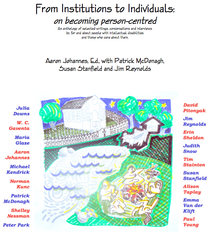From Institutions to Individuals: On Becoming Person- Centred
From Institutions to Individuals: On Becoming Person- Centred is an anthology of selected writings, conversations and interviews by, for and about people with intellectual disabilities and those who care about them.
Half a century after beginning a profound return to their communities, our supports to people with disabilities have never been better poised to generate passionate, hopeful dialogue. Eighteen voices are gathered here to demonstrate the wonderfully engaged and engaging discussion that is taking place all around the world.
The authors invite you to sit by their fire, as David Pitonyak gathers wood, Norman Kunc refutes the ability of a washing machine to bake a cake after all, Michael Kendrick articulates the power of struggle, Paul Young discusses the "cocoon of impossibility" of traditional services and Susan Stanfield renders a changing dynamic.
This anthology is about leadership of all kinds -- from the front of the room to that of parents dreaming and manifesting bigger dreams.
A gathering of some of the most passionate and significant voices in what is perhaps the most interesting and challenging civil rights movement of our times.
Some excerpts:
“. . . we have amassed multitudinous experience of multiple lives lived well, in which the gifts of people with disabilities have been shared widely, to the betterment of their communities and networks. We have success stories. We know how to do it. A different path is clearly marked – we only have to decide to go there.”
From Aaron Johannes, “Introduction: Are We There Yet?”
“Person Centred Planning is one aspect of an important cultural change. This change is one of recognizing the value of diversity in every aspect of life and relationship. This new perception focuses on the value of each individual and the importance of each person’s unique contribution to the broader economy and community. Person Centred Planning is not just a new fad in support service tools of the trade, Instead Person Centred Planning is part of a bigger desire to build a world that works for all its citizens.”
From Judith Snow, “Centering Our Planning On People.”
“I believe that loneliness is the number one cause of difficult behaviors. It is not the only cause, of course, it is just the most common one. . . . We are relational beings and the absence of meaningful relationships makes us sick. It wears us down to the point where we can’t see straight. If you have difficulty believing it, if it seems too "touchy-feely," imagine yourself without the people you love for thirty days. You have no idea where they have gone. Now imagine being without them for sixty days...or ninety...or more. How are you feeling?” From David Pitonyak, “The Importance of Belonging.”
“Maggie demands excellence in teaching. She does not appreciate a classroom arranged with no regard to universal design for learning: she insists on intense interaction with her learning materials. Maggie wants to move, to see, to hear, to feel, and especially to touch. She insists that her classroom learning is personally relevant and that it adds something to her understanding of the world. . . . Through this process, she improves the learning for many other students who might be less effective in their advocacy or less passionate about receiving meaningful content in interesting ways.”
From Erin Sheldon, “Maggie’s Contributions.”
‹ See more book.

